#anti-kataang meta
Text
the anti-Zutara criticism that “Zutara shippers are teenage girls who only like the ship because they self-insert as Katara” is actually so funny because how does that delegitimize the ship? So…girls who relate to Katara like Zuko, and they think Katara would like Zuko, and that’s bad because…girls are wrong? Girls are shallow? Girls don’t know what’s good for them?
Anyway if I were a grown ass man who created a fictional teenage girl that lots of real teenage girls relate to, and these girls believe she would like character B instead of character A, I hope I’d have the humility to say to myself “hmm I wonder why people who relate to this character’s feelings and motivations think she would react this way” instead of jumping straight to “these girls are doomed to like toxic relationships”
(And I know Zutara shippers like the ship for many different reasons, and self-insert is not the most popular by a long shot, I’m just saying that the criticism of self-insert stems from dismissal of what teenage girls like, and that feels kinda misogynistic to me)
#Zutara#pro Zutara#anti bryke#katara#Anti kataang#not really anti kataang but tagging it just in case#I should tag this “pro teenage girls”#My meta
1K notes
·
View notes
Text
Katara's other canon love interests give her agency, and her pov.
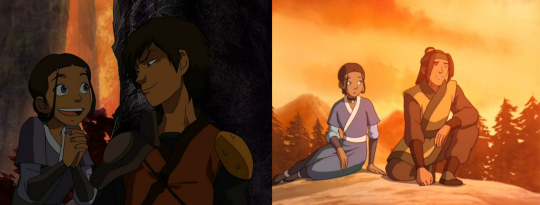
And gets a moment where the two connect over similar losses.

Except Aang.
Kataang is framed entirely from Aang's point of view.

Even when he violates her boundries.
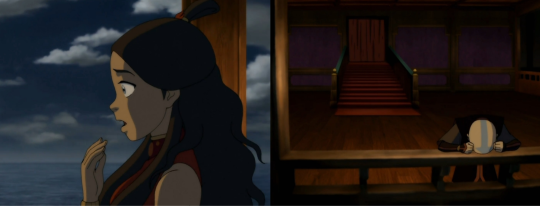
And is unable to handle Katara's grief.

But Zutara?
We get Katara's pov, and give her agency.

He saw her at her very worst, and wasn't at all hostile.

And Katara opened up to Zuko in the most significant way.
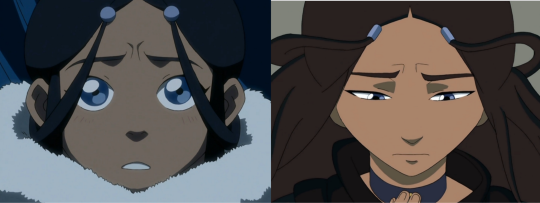
#How are they not canon#katara didn't even forgive Zuko while opening up to her#Aang had 3 books#and yet she opens up to Zuko#not her canonical love intetest#oh my god#zutara#zutara meta#anti kataang#aang critical#anti aang#anti anti zutara#kataang critical#the southern raiders#atla critical#anti bryke#bryke critical#avatar critical#pro zutara#pro zuko#zutara analysis#zutara was robbed#zutara forever#zutara evidence#katara of the southern water tribe#katara#zuko#zuko x katara#kataraxzuko#atla katara
2K notes
·
View notes
Text
Katara and Mutuality in Relationships
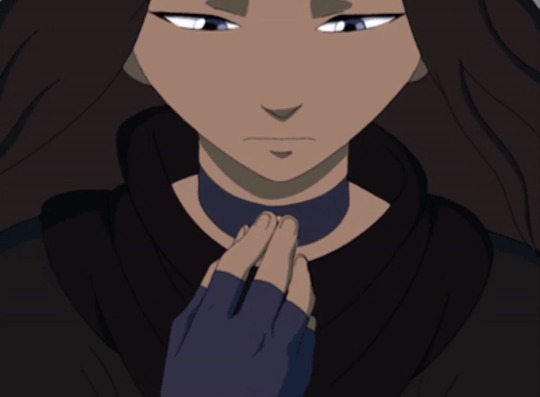
There are lots of conflicting opinions about which characters Katara felt attraction towards, which characters she didn’t, and how long she felt that attraction. I see in most cases, people point to quick clips of her faintly blushing or kissing another character on the cheek as evidence, but I think these kind of takes miss the nuance of the purpose attraction serves in a story.
Most importantly, I see these characters treated as if they are actually people capable of making their own decisions. It’s important to remember that these are fictional characters. They don’t make their own choices; the writers make their choices for them for the purpose of telling a story. From that standpoint, it’s more valuable to examine how a character’s story and narrative themes tie into their relationships with other characters. Animators can shove in a kiss or a blush wherever they want, but it’s harder to demonstrate through storytelling how and why two characters might feel attraction towards one another, and how a relationship between them would develop both characters and contribute to the overarching themes of the story.
In other words, when discussing which characters Katara is “attracted” to, I’m discussing which relationships and actions within the narrative build on her established story and arc. Romance is always integrated into a story for a reason, and considering that reason is important.
Unfortunately, ATLA is very much a product of its time in this way. It’s easy to see what romance adds to the arcs of the male characters—but not so much with the female characters. All three canon relationships (kataang, sukka, and maiko) follow this trend to some degree. The primary purpose of the woman in this narrative is to act as a prize for the man for performing some good deed. Once they’re together, she ceases having her own motivations and becomes an extension of the male character she’s dating. This is pretty blatant with Suki—she barely had a personality in that later seasons; she is there to be Sokka’s girlfriend. Similarly, Katara becomes a completely different character—she’s even animated differently—when the narrative pushes her into romantic scenes with Aang. Her character is flattened.
So what is Katara’s arc, and how do the romantic interactions she has throughout the series contribute to this?
Well, that could be a whole other essay itself, but to put it simply, Katara’s arc is one of a young girl devastated by grief at a young age clinging to hope that she has the power to fight and change the world for the better. Which she does as she gains power and confidence throughout the series—culminating in her defeating Azula in the finale.
But the part I want to focus on here is how Katara connects with other characters. She connects with them over shared experiences of grief and loss.
Take Haru, for instance.
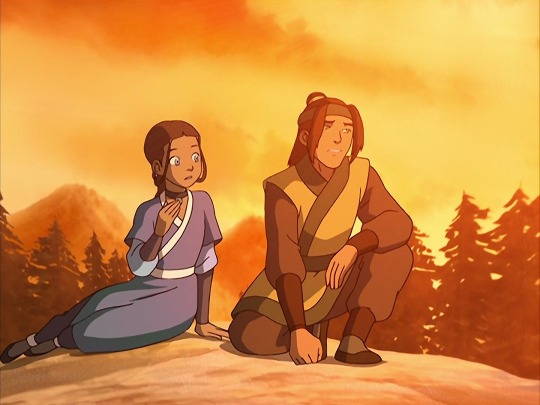
Haru: After the attack, they rounded up my father and every other earthbender, and took them away. We haven't seen them since.
Katara: So that's why you hide your earthbending.
Haru: Yeah. Problem is…the only way I can feel close to my father now is when I practice my bending. He taught me everything I know.
Katara: See this necklace? My mother gave it to me.
Haru: It’s beautiful.
Katara: I lost my mother in a Fire Nation raid. This necklace is all I have left of her.
Haru: It’s not enough, is it?
Katara: No.
This isn’t just a throwaway moment; it’s an important character moment that leads up to growth and the progression of Katara’s overall story, both in this individual episode and in the whole series.
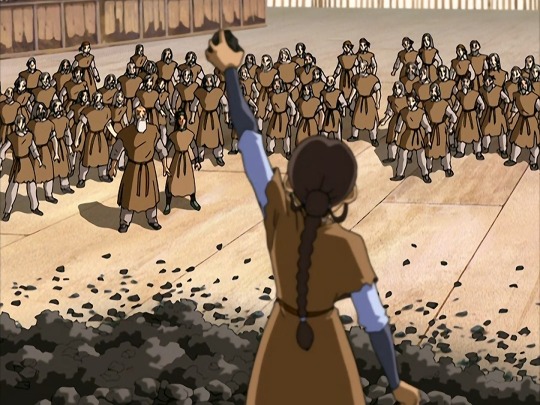
Katara finds her power in the connections she’s able to make with other characters. It’s a powerful driving force for her that makes her a strong character even before her bending abilities develop. Imprisoned was such an important episode to establish who Katara is and what her power is, and adds so much to her arc.
But there is one line in particular from the above exchange that also stands out: Haru says “it’s not enough, is it?” and Katara agrees. Even this early in the series, we’re establishing the fact that despite her drive and hopeful outlook, Katara feels deeply hurt, she feels a deep sense of loss that she opens up about to other characters in moments like these. But unlike Haru…Katara can’t go rescue her mother. Her mother is dead, and we see her grapple with that grief throughout the series.
Another character she reaches out to like this is Jet.
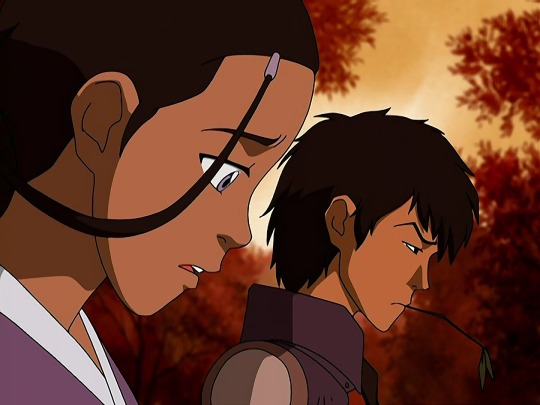
Jet: Longshot over there? His town got burned down by the Fire Nation. And we found The Duke trying to steal our food. I don't think he ever really had a home.
Katara: What about you?
Jet: The Fire Nation killed my parents. I was only eight years old. That day changed me forever.
Katara: Sokka and I lost our mother to the Fire Nation.
Jet: I’m so sorry, Katara.
Another important note about Jet is that there are explicit romantic feelings from Katara in this episode. Again, Katara empathizes with another character through a shared sense of loss. Sadly, in this case, Jet manipulated her feelings and tricked her into helping in his plot to flood the village…but those feelings were undeniably there.
That was the tragedy in this episode, but it also gives the audience so much information about Katara as a character: what motivates her, and what she wants. Katara is established as a character who wants someone who will connect with her and empathize with her over her loss—her greatest sense of trauma. She wants to help others but also receive support in return. The reason why she was smitten with Jet, beyond just initial attraction, is because he gave her a sense of that before Katara realized his true motivations.
A lot of people make the claim that Aang is good for Katara because he also feels a sense of great loss and trauma. And while on paper that’s true…does he really demonstrate that? I just gave two examples of characters Katara connected with this way, and both responded with deep empathy to what she said. Very early on in the show—the third episode—Katara attempts to connect with Aang the same way. How does he respond?
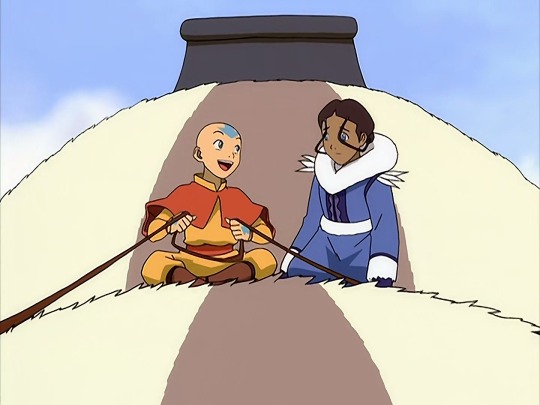
Katara: Aang, before we get to the temple, I want to talk to you about the airbenders.
Aang: What about 'em?
Katara: Well, I just want you to be prepared for what you might see. The Fire Nation is ruthless. They killed my mother, and they could have done the same to your people.
Aang: Just because no one has seen an airbender, doesn't mean the Fire Nation killed them all. They probably escaped!
Just compare this exchange to Haru and Jet. No effort to empathize, not even a “sorry for your loss” or anything. It’s a stark contrast, and the reason for that is because this narrative entirely centers Aang. Katara’s narrative always seems to be secondary to his when they’re together—which is exactly my point when I say this relationship has a fundamental lack of mutuality. It’s built that way from the beginning of the series. It does not add to Katara’s arc nor establish what about this dynamic would attract her.
And, look, before someone jumps down my throat about this…I’m not saying Aang is a horrible person for this response. I think it’s a sign that he’s immature and has a fundamentally different approach to problems than Katara. Katara is a character who has been forced to take on responsibilities beyond her years due to being a child of a war-torn world. Aang’s approach to problems is avoidance while Katara never had that luxury. It doesn’t mesh well.
This is all in Book 1. I honestly could have gotten on board with Kataang if the series meaningfully addressed these issues…but it didn’t. In fact, they actually got worse in some ways.
Back to Katara’s mother. We’ve established that this is a core part of Katara’s character and like in the scene with Haru, she indicates that this is an unresolved issue that pains her. But then, in Book 3, Katara actually does get a chance to confront this pain.
This would have been a powerful moment. Surely the character who is meant to be her partner, her equal, would have been there for her. Surely he would have understood and supported her, fulfilling her narrative and adding to her story.
But Aang didn’t do that. I won’t go into details because there are a million analyses out there on The Southern Raiders, but Aang’s response to Katara was the opposite of understanding. He got angry with her, insinuated that she was a monster for wanting revenge, and tried to dictate her behavior according to his own moral values. And importantly, from a narrative standpoint, he did not go with Katara. One of the most important events in her arc, and Aang didn’t support her—he actually tried stopping her. He didn’t contribute to her growth and development.
Also noteworthy:
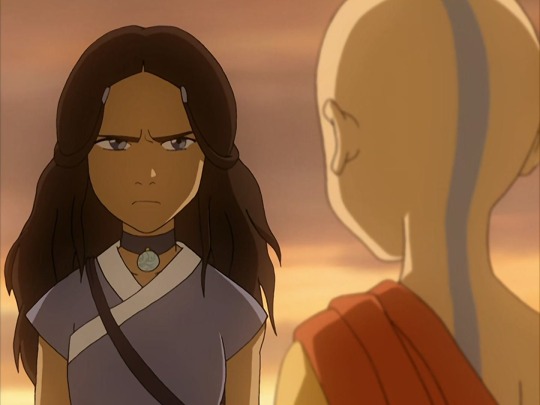
Katara: But I didn’t forgive him. I’ll never forgive him.
Even at the end of the episode, Aang clearly doesn’t understand at all what Katara is feeling. This line demonstrates it perfectly. He thinks she forgave him when that wasn’t the case at all…but of course, he didn’t even accompany her, so he didn’t see what actually took place. His worldview is fundamentally different from hers, and he’s consistently too rigid in his morality and immature to center Katara’s feelings.
Throughout Katara’s whole arc, her most significant character moments, Aang’s character just doesn’t come through the way Katara’s constantly does for him. Their narrative lacks mutuality. When Katara and Aang are together, she becomes an accessory to him. The ending scene is a perfect demonstration of this.
Now, to address the elephant in the room.
Which character does actually add to Katara’s narrative and support her growth as a character?
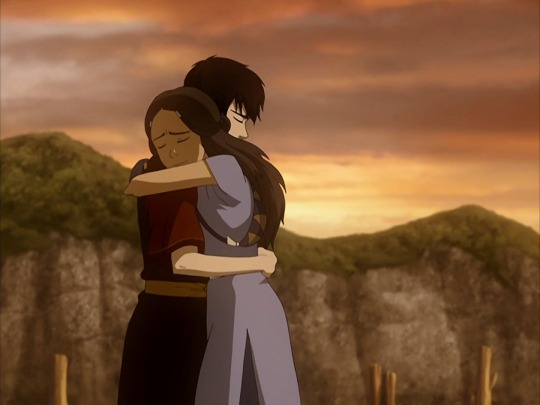
Correct! I just talked about how important The Southern Raiders is to Katara’s character and story, how it’s a chance for her to finally address the grief she’s been carrying since Book 1. And who stood by her side throughout this pivotal moment? Right—Zuko did.
You can talk all you want about how he’s a “colonizer” while Aang’s people suffered genocide, but you’re forgetting that “show, don’t tell” is one of the most basic aspects of storytelling. The fact is, despite how it looks on paper, Zuko was the one there for Katara at her critical moments. Zuko empathized with Katara more than Aang ever did—as demonstrated in this episode. Zuko never once brought up his own cultural values. Zuko never once told Katara what to do. Zuko’s position was that Katara should be the one to decide, and that he would support any choice she made. He supported her decision to spare Yon Rha, but he would have also supported her if she decided to kill him. I actually found this episode to be a satisfying reversal to what is typically seen in TV—for once, the female character is centered while her male counterpart takes the backseat and becomes a supporting role to her narrative.
Even before this, Zuko is shown to empathize with Katara.
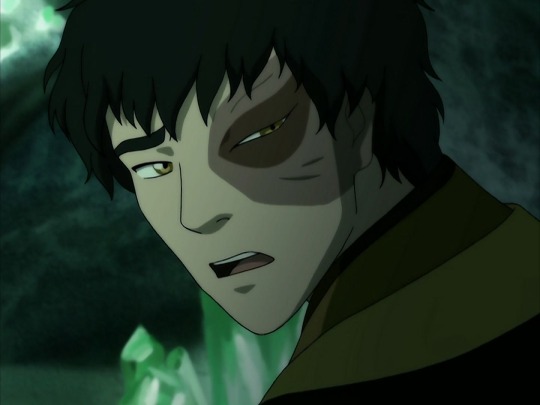
Zuko: I’m sorry. That’s something we have in common.
I think what gets me about this scene is the fact that he’s still Katara’s enemy, and she was just yelling about how she hates him and his people. But despite that, Zuko still empathizes with Katara. She is fundamentally human to him, and he expresses that to her in a way that allows them to connect. Zuko stands to gain nothing from this. It’s true that Azula entered the picture and twisted things around—but in this moment, Zuko’s compassion is genuine. His instinct was to respond to her grief with empathy, just like she consistently does for other characters.
And finally, how else does Zuko add to Katara’s arc?
I don’t think there is any more perfect of an example than the finale itself—the culmination of the arcs and development of all characters.
Zuko and Katara fight together. In a heartbeat, Zuko asks Katara to fight by his side against Azula, because he trusts her strength. She’s his equal—both in his mind, and in a narrative sense.
Then, this:
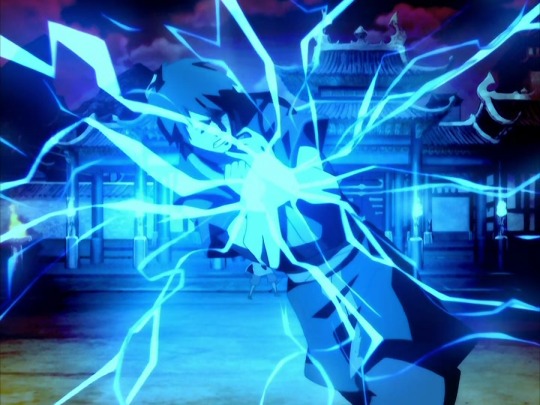
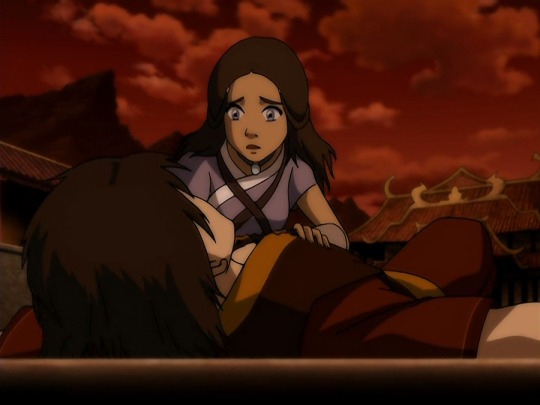
Both of their roles are so critical in this fight. They both save each other. The scene has such raw emotion to it. These characters were together at the conclusion of their respective arcs for a reason.
This is the perfect conclusion to Katara’s arc. She just played a critical role in ending the war that has caused her trauma her whole life. She just demonstrated her mastery of waterbending (another thing she’s dreamed of throughout the series) by defeating the world’s most powerful firebender during Sozin’s Comet. Even though she had help as all characters do, these are victories that belong to her and demonstrate the growth and power of her character. And to top it all off? She was able to save Zuko’s life. She didn’t have to endure the pain of feeling helpless to do anything while someone else died for her; this time, she had an active role, she changed her fate, and she prevailed. Zuko plays an important role in Katara’s story without dominating it. They perfectly represent mutuality. They add to each other’s stories. Their narratives become stronger when they’re together, without one diminishing or sidelining the other.
So, from that standpoint, that’s why I always see the attraction between Zuko and Katara and why I see it lacking between Aang and Katara. Zuko and Katara’s story doesn’t need some cheap little throwaway moments to shine. It’s integral to both characters’ stories. We are shown not told of the way these characters feel about each other. Given everything we know about Katara, her goals, her values, her past loves…absolutely everything points to Zuko being the true subject of her feelings.
Because let’s be honest. The ending I just described is so much more powerful and so much more Katara than seeing her being relegated back to a doe-eyed love interest for Aang to kiss. It hardly even made sense—Katara played no role at all at the culmination of Aang’s arc. She was relegated back to a love interest, rather than the powerful figure we saw fight alongside Zuko.
#zutara#katara#zuko#atla#anti kataang#canon critical#jet#haru#katara deserved better#aang critical#meta#analysis
409 notes
·
View notes
Text
ana's meta masterlist
Pro-Zutara:
the official zutara dissertation: part 1 | part 2
zuko, aang and taking lightning for katara
zutara and romantic coding
"you rise with the moon, i rise with the sun" is a zutara line
zutara and thematic significance
zutara vs jetara
zutara parallels in the awakening
zutara's narrative culmination
zutara in the crossroads of destiny:
azula vs katara
love as resistance in the catacombs
zutara in the southern raiders:
the true source of katara's anger at zuko
katara bloodbending before zuko
the narrative relevance of zutara
zutara and bloodbending
zutara's narrative symmetry
why zuko had to betray katara in ba sing se
Anti Anti-Zutara:
the official zutara dissertation (p.3)
"zutara would face too much opposition from their countries"
"zuko and katara are a colonizer/colonized ship"
"zuko and katara would fight all the time”
"platonic zutara is better than romantic zutara"
"fire lady katara is racist"
“zuko would’ve taken lightning for anyone”
“katara is too traumatized by the fire nation”
ATLA Ship Criticism:
the official zutara dissertation: part 4 | part 5 | part 6
why mai.ko was never intended to be canon
mailee is a better ship than mai.ko
how kat.aang could've been fixed
kat.aang's lack of trust in the southern raiders
emotional labour in kat.aang
kat.aang’s narrative imbalance
comparing katara and aang's parenting
why the fortuneteller does not foreshadow kat.aang
ATLA/LOK:
azula/katara parallels
katara's choice in the crossroads of destiny
was zuko's betrayal in-character?
zuko's comments in the southern raiders
zuko's comments in the southern raiders (pt. 2)
zuko is not a “bad boy”
sokka didn't feel inferior to katara
did mai fear azula?
comparing mai and toph
sexism in the water tribes
thoughts on the atla comics
gratuitous violence in the legend of korra
The Hunger Games:
zutara and everlark parallels
zutara and everlark parallels (pt. 2)
gale's arc in the hunger games trilogy
the myth of humanity's inherent evil
the ending of lucy gray
Squid Game:
individualism under capitalism
the ethics of billionaires
#zutara#anti kataang#anti maiko#zutara meta#been intending to do this forever but i'm on this hellsite so much that going through my archives took an eternity lmao#anyway here's a collection of patented ana rambles
533 notes
·
View notes
Text
I know people have already talked about this topic, but I want to too.

There are a lot of jokes on the Internet about how Katara constantly mentions her mother as if it were the most important event, but...
Isn't that so? I mean, in the life of a little eight-year-old girl, this is truly the most important event in her life and she wants to share it.
Katara took on the role of an adult too early, and she didn't have the opportunity to work through this problem with anyone, because she's already an adult => she cannot afford to rely on someone. But she needs it, and that's what traveling with Aang gives her: the opportunity to find children like her and share with them the burden that she has been carrying all this time. Note that Haru, Jet, and even Zuko are people who not only have experienced loss, but also have some kind of responsibility for others: for their family or even for a group of people. She doesn't tell adults about this because she isn't looking for care, she's looking for understanding of her feelings.
The problem is that it's not enough for her. Her sadness turns to rage because the further the story goes, the less satisfied Katara becomes.
The closer the heroes get to the end of the war, the more angry Katara gets: first at her father, then more specifically at Zuko. And, in the end, she finds the cause of this anger, as well as the opportunity to satisfy the thirst for understanding of her grief - the murderer of her mother. She needed revenge not just because it was fair, but because from the very beginning of the series, Katara was looking for an opportunity to calm those feelings that were rushing out. And her attempts to do this by expressing the problem were not enough. She needed more, and she got it by facing the biggest monster in her life.
In general, the “monster” metaphor obviously speaks not only about Yon Ra, but also about Katara herself. Or rather about her anger. Judge for yourself: she had to restrain a storm of emotions from the age of eight; she began to reveal her grief only in the first season, that is, at the age of 14. She ignored her pain, pushing it deep inside until it became a raging monster rushing out. And what Katara really needed was to face it. So when she flies to find Yon Ra, she also finally meets the version of herself that she has carefully ignored and hidden for the benefit of others.
It's funny that Zuko is the one who helps her. In general, it was his complete understanding of Katara in this matter that amazed me. He, like no one else, knows what it’s like to face your inner demons and knows how useful it is for knowing yourself. And how dangerous it is when you're alone in it. So he accompanies her to keep her safe. So that she has a person on her side who will be there, no matter what choice she makes. He will support anyone. (I'm crying because of how beautiful it is wasgffv💖)
(A small antikataang insert: this is the reason why their relationship doesn't work. Aang only supports the right decisions, even if they require Katara to sacrifice inner harmony, while Zuko will simply support her for whatever choice she makes. It's funny because Aang has to keep balance and as a monk he knows a lot about that. The show focuses heavily on the theme of yin and yang, that is, the balance of good and evil. In order to achieve internal balance, Katara needed to turn to internal evil, because she tilted this scale towards good. She was imbalanced to begin with, and instead of understanding this, Aang insisted on continuing the preponderance of good. It’s as if he doesn’t understand that the preponderance of good is as bad as the preponderance of evil, and this will only harm Katara. I hope my point is clear)
Finally, Katara finds inner peace when she faced everything that was raging inside her, when she did what she needed and poured out everything she ever wanted. Every word about her mother led us to this moment, as did Katara herself.
And do you know what the point is? Why am I telling all this? It's all a character arc that unfolds linearly over three seasons.
Now think back to the arc of Aang, the main character of the show, in relation to his family. Did he bring them up in seasons two and three in a way that was linear? I mean, the one who constantly grieves over his father's death should have been Aang, because he learned the pain of loss so recently, he didn't have a chance to get used to it. But even in the episode SR, Aang compares the loss of mother not to the loss of his mentor and father, but to the loss of Appa and his people. It’s as if he doesn’t care about the individual connection with Gyatso and it’s nominal.
Katara, on the other hand, has emotions that she smoothly carries throughout the show and resolves in it. She has a huge number of Chekhov's guns, which each fire at its own time. Her feelings about her mother, the development of these emotions and their resolution are the most beautiful thing about this show along with Zuko's arc (even though I have problems with him in book 3).
And making derogatory jokes about it like Katara is whining and annoying is blasphemy. After all, she's the only one of the Gaang who has a single development arc throughout all three seasons, this must be respected
#atla#atla critical#avatar the last airbender#atla meta#anti kataang#anti aang#katara#zuko#zutara#katara supremacy#katara is the real main character change my mind#katara deserved better#katara meta#southern raiders
354 notes
·
View notes
Text
Is Katara "Motherly"? - The Discourse
The whole "is Katara motherly" discourse is a little annoying to me because for one thing its impossible to deny that in canon she acted motherly towards Aang, Sokka, and Toph, with Sokka even saying at one point when he thought of his mother Katara's was the face that came to mind.
But the other problem is that this fits into the shows themes so perfectly of children being thrust into adulthood and enormous amounts of responsibility too easily because of war and the subsequent (or end goals of) genocide, cultural genocide, and colonization. Katara's motherly characteristics are of the show's own making, they're right there in the text and their there for a reason, and although they weren't given enough attention as they should have been, there is no doubt that this is treated as, not exactly a tragedy, but as something bad and debilitating to Katara and her teenagerlike need to goof around with her friends.
But for whatever reason, the fandom seems to think that this characterization is fan made. Katara is supposedly forced into a motherly role by the fandom, particularly the zutara fandom, when in reality it is the show that does this to her. And the whole idea of momtara and dadko is that Katara doesn't have to be the mom anymore. She doesn't have to be the one solely responsible for the chores and the cooking and the emotional labor. She has a partner, and equal, who is willing to put forth the time and energy to assist her in what she feels obligated to do, and to tell her to go sit down sometimes before she burns herself out.
Could the other kids besides Zuko do this? Of course. But as we've already established, everyone in the gaang besides Suki shoves Katara into a motherlike role. Is this their fault? It's hard to say. Toph at least has a heart-to-heart with Katara about it, and Sokka's idea of her as a mother largely stems from trauma.
But my significant problem with Katara's motherly traits comes with the fact that there is no real closure to that arc in the "Runaway". Toph and Katara talk mostly about Toph's parents, and Toph tells Katara that she thinks she is capable of having fun. But other than that, there's nothing. The boys don't have to come to terms with the fact that Katara does not want to be seen (solely) as motherly or put in that position. Instead, the show gives us a few colorful explosions and subtlety implies that it is a little bit Katara's fault that she is seen that way. But again, that's not the fault of the zutara fandom or a reason the trope of momtara and dadko is problematic. It seeks to acknowledge these character traits in Katara, which a lot of kat@angers refuse to do, and give her a way to work past the trauma that caused them and help her adjust to a more healthy amount of stress and pressure on herself for a kid her age.
#the random desire to write in conclusion at the end of these#katara#atla#avatar the last airbender#zutara#anti kataang#the gaang#zuko#toph#sokka#suki#aang#bryke critical#anti bryke#atla meta#katara meta#zutara meta#katara deserved better
194 notes
·
View notes
Text
What Aang’s Relationship With His Kids Tells Us About His Relationship With Katara
Bumi: “Oh, boo-hoo. Must've been real hard for you, flying around the world with dad, riding elephant-koi all day.”
Tenzin: “Oh, so that's what this is all about.”
Kya: “That's what it's always been about. You think you're some savior who has to carry on dad's legacy.”
Tenzin: “Who else is going to do it?”
Kya: “How about all of us?”
Bumi: “Yeah, we're Aang's kids too.”
The whole problem with this family is, Aang didn’t believe that.
Aang has a long, undeviating track record of never questioning anything he believes about the Air Nomads. Who the hell has a perfect and complete understanding of their society, government, international relations, education system, religion, morality, genetics, and reproduction at age 12? According to Aang? He does.
The entire lynchpin of Aang’s Book 3 arc is all about how Air Nomads are pacifists and cannot ever under any circumstances harm a life. (We’re going to ignore the body count Aang’s already wracked up over the first two seasons for the sake of preserving his feelings because those were soulless NPCs or something.)
And yet Aang never questions this…

Monk Gyatso’s bones surrounded by a pile of Fire Nation soldier bones. The picture doesn’t fit Aang’s image of Air Nomad peace and harmony, so he ignores it entirely. It NEVER comes up despite its overwhelming relevance to Aang’s internal conflict and the sorts of advice he seeks from authority figures in the third season (despite Monk Gyatso being the penultimate authority figure in Aang’s life).
Another thing Aang never questions?
There’s no such thing as a non-airbending Air Nomad. They’re just all born that spiritual. And spirituality is the golden key that unlocks bending. (Because Bryke said so.)
Despite Guru Pathik not being a bender. Despite the fact that Zhao, literal spirit murderer, is one. Despite Toph—the most un-spiritual, cynical, feet-on-the-ground-head-nowhere-near-the-clouds member of Aang’s friend group—being the most powerful bender of the lot. Despite Hama being a waterbender equal to none but Katara while completely cut off from her culture and turning her back on everything we believe about water bending’s inherent ties to community, connectedness, and love (Iroh’s words). Despite Azula mastering the god-tier lightning technique BECAUSE she’s practically dead inside and values life least of all things. Despite the fact that Princess Yue has the literal MOON SPIRIT THAT IS THE SOURCE OF ALL WATERBENDING living inside her, and yet she still somehow manages to not be a bender.
Despite the fact that Air Nomads roam all over the world, sewing their wilds oats throughout every nation, yet no airbending toddlers ever crop up in Fire Nation or Earth Kingdom preschools.
Despite the fact that non-monogamous societies where men have multiple partners father more children and boost the population faster than in societies that favor “attached” relationships, yet the all-airbending Air Nomads still somehow have the smallest population of any ethnic group in the world.
Despite the fact that Aang’s twin, Ty Lee, is RIGHT. THERE. with her unparalleled aura-seeing, chakra blocking spirituality and her GRAY EYES in a world where color coding is ~totally~ not a thing… *sigh*
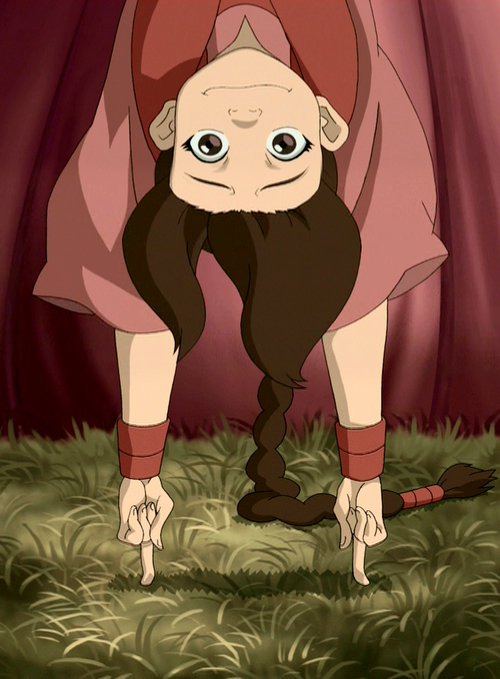
But nope. Air Nomad parentage = airbending child. Always.
So when Katara births a child that is… not an airbender? Not any kind of bender at all, in fact. There’s only one logical conclusion (in Aang’s mind).
That is not Aang’s child.
Aang never had a problem traveling with non-airbenders before. He was non-exclusionary by nature. Katara and Toph and Zuko were welcome. Sokka and Suki were welcome. The more, the merrier, in fact. Because Aang loves nothing as much as he loves an adoring audience.
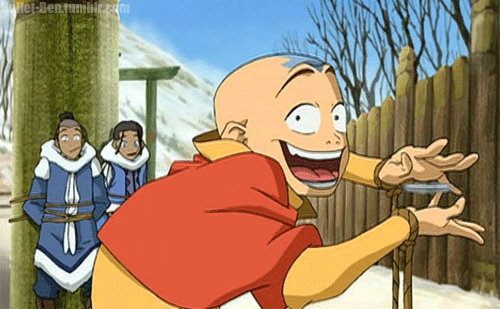
Yet Bumi never travelled with Aang.

Bumi’s as old in this picture as Aang was in the first series. He had an entire decade in which he should have been the most important thing in his parents’ lives. His personality was already more or less formed (not completed, but the groundwork was laid) by the time Tenzin came along. Bumi’s inferiority issues began long before there were any airbending children around to siphon Aang’s attention for training purposes.
Aang and Katara didn’t have another child until Bumi was on the verge of adolescence because Aang was convinced that Katara cheated. And I’m guessing it took Mr. “Let Your Anger Out, And Then Let It Go” about ten years to forgive his wife and give her the chance to get it right. (Which is at least four years longer than he gave her to forgive her mother’s murderer, in case you forgot.)
Acolyte: “Sorry, I thought you were the servants.”
Bumi: “We’re Tenzin’s brother and sister!”
Acolyte: “Avatar Aang had other children? The world is filled with more airbenders?!”
Kya: “We’re not airbenders.”
Acolyte: “Oh… I’m so sorry.”
The Air Acolytes—whose whole identity, purpose, lifestyle, and religion center around every detail of this man's life and beliefs—didn't know Aang had more than one child.
The best case scenario here is that Aang simply pretended his older children didn’t exist because he was ashamed of them and made Katara keep them shut away at all times.
And maybe that could have worked… If Aang and Katara had ever had any privacy in their relationship. But they didn’t.
The Air Acolytes have been following Aang and Katara since the comics. They’ve been there at every step of Aang and Katara’s life together. Observing. Fangirling. Emulating. Diefying. Looking for weaknesses in the relationship because Katara was only his “first girlfriend.”
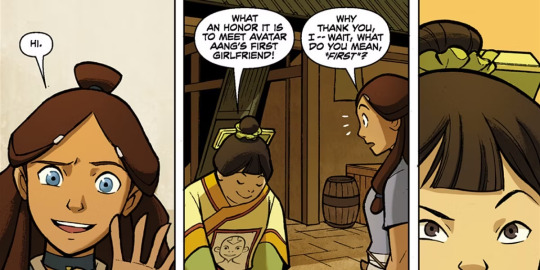
Yet, somehow, they didn’t know Aang had three children.
I can’t imagine a way for them not to know unless Aang actively told people, “Those aren’t my kids,” and let Katara bear the shame and stigma of having the world believe she was unfaithful.
All because Aang couldn't entertain the idea that he was wrong about some facet of a society he never understood clearly.
351 notes
·
View notes
Text
I'm seeing so much commentary on people reacting to the live action atla toning down Sokka's misogyny
and I'm over here like this is a total non-issue because in my own rewrite of the show I already did that exact thing, it makes complete sense to do it and they should do it because it's a weaker aspect of the original show
Sokka's early misogyny is utterly cartoonish in comparison to the set up of the rest of the SWT, it doesn't feel realistic for the only teenaged boy in a dying culture surrounded by adult women with a grandmother who left a more out and out misogynist society to act the way he does
how Sokka "resolves" his misogyny is equally cartoonish, I never liked how in The Warriors of Kyoshi literally episode 4 of the show makes a teen girl compromise her own culture with a female only fighting tradition teach a boy who is supremely rude and disrespectful to her and then still be attracted to him afterwards, it's more misogyny to fix misogyny and is very obviously men writing about how to fix misogyny especially as they have Aang make a joke about Sokka wearing a dress after going through how meaningful the fighting costume is and how a lot of Asian clothing with hanfu influences like atla borrows from would have men in what to western eyes would be dresses, Aang has already seen multiple male authority figures in robes, the joke makes no sense
I also wouldn't consider Sokka's misogyny genuinely resolved after this, consider how the show deals with his romantic relationships with both Yue and Suki and how both can be seen as extensions of how Kataang is treated in the show, rewards for the hero, especially with how Sokka interacts aggressively with Hahn instead of respecting Yue's wishes whatever her reasons for them, I think an argument can be made that Yue's death is a fridging for Sokka's storyline rather than or in combination with being a consequence of Aang's failure as an avatar or the culmination of her own storyline where she fulfills her duties as a leader to protect her own people
Beyond his romantic relationships, while Sokka drops a lot of his more misogynistic language with Katara, he doesn't support her when she faces off with the NWT leaders to learn waterbending, and he still leaves the caretaking and food preparation and grocery shopping to her which is more common than him going out to hunt or gather in order to provide for the group while he takes a leadership role like determining their travel schedule and routes, it is not an even division of labor and falls along traditional sex stereotypes
In addition to his typical duties to the group, Sokka also remains invested in the trappings of masculinity after ep4, he's concerned about what's manly and how he compares to Jet for example, there's no investigation or interrogation in his interest in meat and hunting and how they relate to masculinity and his misogyny, in the episode with Piando, his insecurity as a non-bender is resolved by giving him a new male mentor and a new martial skill, sword fighting, which is masculine in both western and Asian cultures rather than assuaging his self esteem issues in any less stereotypically masculine ways, I also think it was done so he could compare more favorably to Zuko, another male character, and even his interest in engineering and mechanics comes with a male mentor and is a traditionally masculine pursuit
the show's poor handling of misogyny also extends beyond Sokka, with the NWT, the show acts as if Pakku is the only reason the tribe is misogynistic and the only consequences to that misogyny is that women can't waterbend and there are arranged marriages, and that both the NWT and Pakku's misogyny is resolved by allowing only Katara to learn to waterbend which she doesn't even earn on her own merits, she gets the opportunity because Pakku likes her grandmother
none of this is realistic, misogyny is not because of one bad apple, Pakku doesn't make Yue's arranged marriage, Chief Arnook does, he picked Hahn for her, and the show acts as if Arnook has no authority to compel Pakku to teach Katara or any ability to persuade him in order to reduce his culpability in the NWT's misogyny as its leader to make him a more respectable character so it's not uncomfortable when Aang and Sokka follow his orders in the battle later on, but women not being able to bend and forced into arranged marriages is still status quo when the gaang leaves, Yue's just dead
I'm not even convinced the show runners understand what's wrong with arranged marriage, the issue is not Yue can't be with Sokka who she likes and at most has a slight crush on cuz she's only known him for like two days, it's that she's being treated as male property, a broodmare, and a vehicle to ensure Hahn receives the throne because her father has no male heir and picked some guy to succeed him instead, like it's not explicit in the show but that is the implication based on the historical reality of princesses in arranged marriages, and the show has her get out of it only through death idc that she ascends to being a spirit, it's still a teen girl that dies
There's also no discussion by the show of the Earth Kingdom's misogyny when it has the exact same shit going on, Toph is the only female earthbender in the show not including avatars, there might have been a female earthbender in the background when Katara broke them out of prison, but I'm not really counting that, the entire army and Dai Li are all made up of men, the EK might even be worse because the show doesn't demonstrate that women and girls even have the capacity to earthbend aside from Toph and avatars and Toph doesn't even learn from a human, she has to learn from animals, the show treats this as commentary on her disability but the show has no compelling reason why it can't also be commentary on her sex, Toph was also originally supposed to be a boy so this could have ended up so much worse there literally would have been no female earthbenders aside from avatars at all, I'm not counting Oma as she might just be a mythological figure not a real person that once lived
The Fire Nation kinda barely avoids the same issue, Azula is the only named female firebender aside from avatars in the show but she has two female sidekicks who despite being non-benders show martial skill and there are clearly female soldiers and guards in the FN military so there are much stronger implications of female firebenders existing and being completely allowed to train their abilities and that Azula isn't exceptional in that respect like Toph is, only for being a prodigy with blue fire
Azula was also originally supposed to have an arranged marriage in s3 and they dropped it in favor of showing that royal and noble girls could casually date in the FN which has wild implications for women's empowerment in the country more so than but especially in combination with the fact women can train and join the military (which is why I say the FN is not fascist it's literally the least misogynistic country aside from Kyoshi and by like a country mile so it's literally not misogynistic enough) not that the show does anything more than minor teen drama with it
again, the vast majority of this misogyny is completely unremarked upon by the show especially after s1 when they leave the NWT, it is clearly a fictional world made by men with no true understanding of misogyny just a vague awareness that misogyny is bad and what the really obvious and outdated examples of it are, this is a narrative inconsistency in the show to have the examples and commentary on misogyny be so cartoonish in the beginning and then disappear after s1
your options to resolve this inconsistency is to either go all in with more realistic misogyny and provide commentary on all of it but this takes effort and will be divisive, or take the easier route and ease off the cartoonish-ness of it and comment less on it to avoid drawing attention to all instances of misogyny in the show
obviously Netflix was gonna do the latter
(not me tho, I'm making it less cartoony and dealing with it in my rewrite)
#atla#live action atla#atla critical#anti bryke#anti kataang#anti sokka#its not really anti him more anti how his character was written and dealt with#long post#meta
384 notes
·
View notes
Text
"ANTI AANG TAKES" BINGO CARD + Fanfic ver
Well. The ultimate "Anti aang" Takes on a bingo card, go to the tag, see how much can be crossed out

Here's a fanfic version, though I don't have much experience in that section -

Yeahh...
#pro aang#aang defense squad#aang#aang meta#atla#avatar the last airbender#this shit is exhausting#Its funny asf tho#How is this even the same person?#Aang is not fucking vanilla he literally steals n shit he a menace#they can never make me hate you#Dont know what else to tag#anti zutara#anti zutara fandom#pro kataang#kataang
180 notes
·
View notes
Text
I’ve seen lots of conversation on here about Zutara shippers opinions on aang and mai and i thought I’d give my point of view.
I want to start by saying that I think there should be more of a distinction between disliking a character because they are a bad person and disliking a character because they are written badly. With that being said, I can confidently say that, with the material of the main ATLA show, I dislike Aang and Mai because they are badly written characters. Meaning, if their arcs were properly finished, I would have no problems with them. This brings me to another topic of how I don’t really ‘hate’ characters who are bad people if they’re well written but that’s a conversation for another post.
I need to point out that I didn’t start disliking Aang and Mai until they had their arcs undermined when Kataang and Maiko became canon. With the arcs they were going on, they had so much potential to be really interesting and I enjoyed their personalities.
When it comes to Aang, I had no problem with him as a character until season 3 part 2 when I started to realize that his world view (which is flawed based solely on the fact that he is young and there is no way he’s going to have a nuanced pov) was not going to be challenged. Aang should have had to give up katara. Aang should not have just had everything handed to him with the lion turtle and the pointy rock.
Then there’s the southern raiders which I would argue, if Aang’s arc had been completed, would not illicit as many conversations and arguments about it as it currently has. Because his actions in that episode make sense (Sokkas don’t really but again-that’s another story) because he’s a kid. This episode should have been a big decider of his change in worldview. The problem is that the creators decided his flaws didn’t exist and that he was perfect. (At 12 years old?!?!?)
Then there’s Mai. She’s a much smaller character but that doesn’t mean she deserves less of an arc. Mai is a character whose personality I love! (I’m all for gloomy depressed women!) There’s two ways Mai’s character could have developed, and I think both options are great, the problem is that Bryke decided to go in neither direction.
On the one hand, Mai could have been a representation of unlearning the propaganda she was taught in the fire nation throughout her whole life. I think this direction would make Maiko more believable, although I still don’t think they are a good couple because their personalities create a toxic dynamic and Mai’s story with Zuko is meant to represent that toxicity.
The second option would be to have her views not change, like we see in the show, and have her not get back together with Zuko. This is the more interesting path in my opinion because it’s more realistic. I don’t think the problem with Mai’s arc lies with her personal views of the fire nation, more so with her relationship with Zuko. As we have it in the show, Mai’s views don’t change. Therefor, it doesn’t make sense for her character or for Zuko’s for them to get back together like nothing ever happened.
When it comes down to it. Both Aang and Mai had their arcs sabotaged because the creators rejected Zutara. Even without Zuko and Katara getting together these were the wrong decisions. Both characters had potential to be well written, but in the end, the creators chose the path didn’t allow that to happen because they just couldn’t kill their darling. (Kataang)
Sorry for rambling, this is kind of just my take on the whole “Zutara shippers hate Aang and Mai” take.
#is this a meta?#atla#avatar the last airbender#anti aang#anti Mai#anti kataang#anti maiko#anti bryke#zutara#ayo fuck bryke all my homies hate bryke#atla critical#aang critical#Mai critical
183 notes
·
View notes
Text
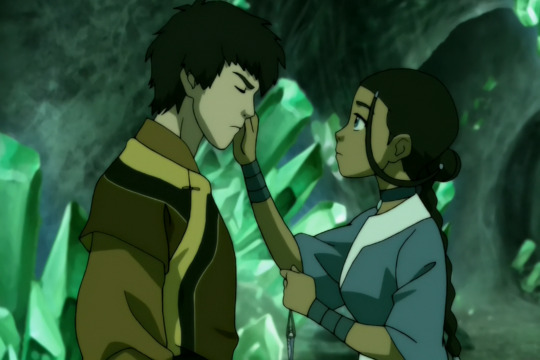
Yes, I'm here for Zutara. No one can change my mind. I've been shipping them since I was a kid, long before I knew about shipping and fandom. When I re-watch ATLA, I shipping them even more. When I watch Zutarian art and video, I shipping them even more. When I read Zutarian meta, fanfic, or headcanon, I shipping them even more. Even when I read canon shipper points, I still love and shipping Zutara even harder. I mean, just look at their chemistry! And some people still denying.
#atla zutara#zutara#anti anti zutara#pro zutara#antikataang#anti kataang#anti maiko#katara x zuko#zuko x katara#katara and zuko#zuko and katara#momtara and dadko#dadko#momtara#steambabies#zutara fanart#zutara meta#anti bryke#zutara was robbed#zutara analysis#zutara edit#zutara headcanon#zutara fandom#anti zukka#zk
201 notes
·
View notes
Text
Nothing about Ka/taang precludes Katara being Chief of the SWT…
which is why it pisses me off even more that Katara didn’t get to have a role of any political importance whatsoever. It wouldn’t change anything about LOK’s storyline, and it would be fully in line with her character.
There’s a common anti-Zutara argument that Katara wouldn’t want to be Fire Lady, because she would want to rebuild and lead her own culture. I am sympathetic to that. Based on her canon characteristics, she might want to be a United Republic Councilwoman, Chief of the SWT, or just generally the Waterbending Master / Matriarch of the her tribe, which would be easier (though not impossible) if she weren’t married to the sovereign of another nation — I get that.
but the thing is…she didn’t get to do any of that, even though “wife of the Avatar” doesn’t contradict those roles. All the things that would be difficult for her to do if she were married to Zuko, she still didn’t get to do as Aang’s wife. She didn’t get to have a career the way her husband, or her brother, or her friends did.
so it’s extra hypocritical when Ka/taang shippers are like “but being Fire Lady would disempower Katara!” when Ka/taang canonically disempowered her! And KA fans are fine with that: they bend over backwards to justify why Katara doesn’t have a statue, or why she wasn’t there to protect Korra from the Red Lotus, or why she wasn’t at Yakone’s bloodbending trial. Yeah she got to live in the SWT — eventually, I assume, because in the comics she just follows Aang around — but what else did she get to do? Fucking nothing, apparently. Because to some people, the greatest honour for a woman is to be the hero’s wife.
#Kataang fans who don’t defend Katara’s stupid post-ATLA arc are fine#but I don’t think I’ve ever met one so#Katara deserved better#anti kataang shippers#anti bryke#Zutara#pro Zutara#Chief Katara#Fire Lady Katara#my meta
330 notes
·
View notes
Text
Why Katara's Lines Come Off As Rejecting In EIP
Like I said in a previous EIP meta, this will be a doylist meta and an isolated look into the scene and the second half of book 3. So first things first, what are Katara's lines and body language?
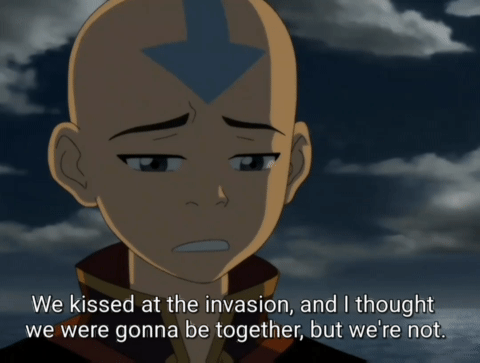
As soon as A\ang brings up the kiss, she turns away, and just says she doesn't know.

When he asks her why doesn't she know, she seems slightly irritutated for a second, gives him a perfectly reasonable explanation, but doesn't hold eye contect for too long before drifting off.

A\ang keeps pushing, so she puts an end to this. This time she stays faced to him to say she is confused, signifying she's more comftable now that his questioning has ended.
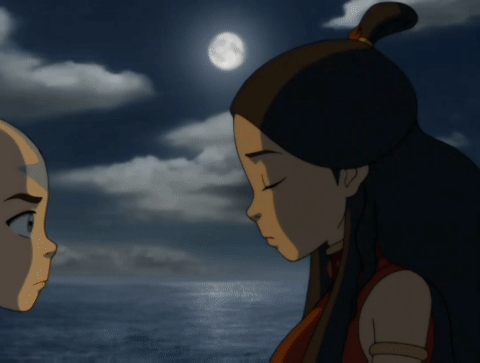
Now it is clear as day that A\ang violated her boundries and she is pissed off.
Her lines and body language tell us two things I wish to break down:
Katara is very uncomftable talking about the possibility of a future romance and can't commit to an answer.
The reason she gives is that she is because she's confused.
2. Katara States That She is Confused
Let's try to take her at face value here. She's genuinely confused about her relationship with A\ang. Do you know what is the first role of storytelling? Show don't tell. If the writers wanted to show us that Katara trurly is confused, we should be seeing Katara grapple with that.
It wouldn't break the "Will They Won't They" tension, if anything, it'd amplify it. We can see this in action all the way back in season one, where Katara also is confused and considers if A\ang is a possible partner.
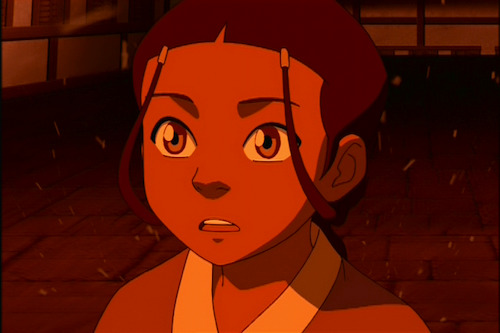
So, is that what we see? Small moment/moments of Katara looking at A\ang, being confused and considering him as an option? No, we do not. Instead, what we get from Katara, is...

We are told that Katara is confused, but what we're shown is Katara completely ignoring the source of her supposed confusion. What we're shown is not confusion, it's denial.
This is a sharp contrast to how well the writers made sure to remind us that Katara is still angry at Zuko over the course of these very episodes. From her threatening him when he first joins, to a mean spirited comment (at 0:21), there was a clear effort to keep up the tension, to make sure you know that Katara hasn't forgiven Zuko yet, until said tension is resolved. Meanwhile with Katara and A\ang what we see is the show, and by extension Katara, in denial to the whole event.
1. Katara is Uncomftable and Unable to Commit
If she is in denial and A\ang is making her face reality, would her behavior in the scene be compatible with that? Would she keep on avoiding the topic? Could her words register that way based on who she is? To know that, we could ask: does she have a history of shielding A\ang from reality?

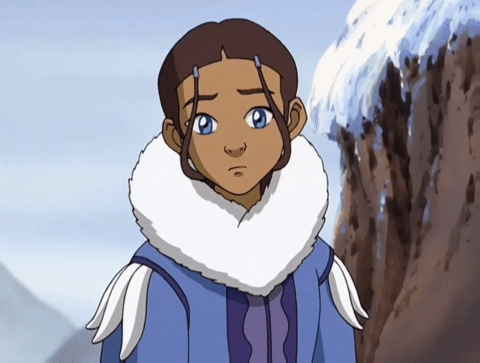
(If the scene was revealed to be her shielding him), this isn't to say that Katara would consciously shield him the way she does here, she could've genuinely thought she was confused. There would be many ways to interpret the scene. However, it is in character for her to want to keep the peace to protect him from being hurt. Therefore, her lines in EIP could easily register to be of a similar fashion.
The show continuously refused to show Katara being confused, showing us nothing but denial. When she is faced with the reality, she refuses to commit when having a history of trying to shield A\ang for as long as she can. And this is why Katara's lines in EIP come off as rejecting.
#anti kataang#anti kat@ang#anti k@taang#TAGGING FOR VISIBILITY->#zutara#zuko x katara#katara x zuko#zutara meta#pro zutara#anti anti zutara#zutara analysis#zutara evidence#zutara forever#zutara nation#zutara should have been canon#zutara supremacy#zutara was robbed#zutarian
221 notes
·
View notes
Note
what exactly is Aang's toxic masculinity that you're talking about? there are no examples of such behavior on his part in the show. he is not an ideal person, he is a child who sometimes behaved incorrectly, just like all the other children in the show (Katara, Toph, Sokka), and this is normal.
in addition, we see how he regrets some of his wrong actions and gets better, while Zuko does not regret his toxic behavior, doesn't apologize and doesn't face the consequences of his behavior (racist jokes about Aang, demands that Katara forgive him as if he has the right to her forgiveness, an attack on Aang to "teach him a lesson" and many other things).
Hi anon, thanks for the ask! This is a very good illustration of what I was talking about in this post when I mentioned that I feel toxic men are overlooked more often for appearing “nice” than they are for being conventionally attractive.
No examples of toxic behavior in the show? What do you call this then?
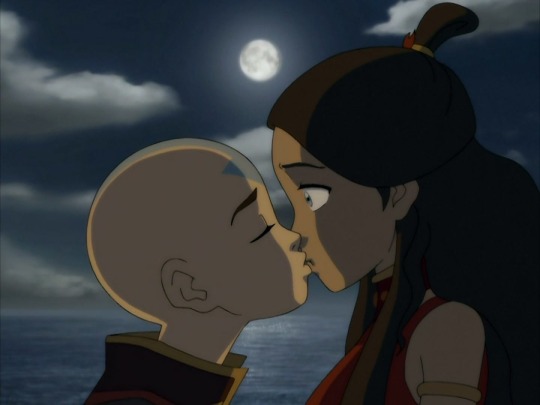
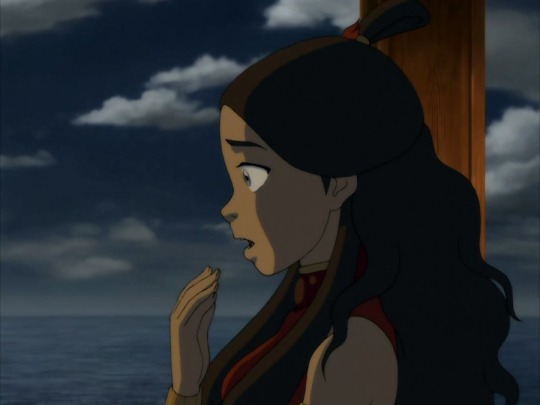
I know what I (and the law) call it:

But you see, he’s “nice” right? This is just a misbehaved child, as you put it? Yah, no. He knew better and still did it because he was possessive; this whole interaction started because he was jealous that an actress playing Katara was interested in men other than him. And the show proceeded to frame the situation in a way that made Aang sympathetic, despite being the aggressor and the one behaving irrationally. How much more “toxically masculine” can you get than that? But he put on a flower crown once so we’re supposed to think he’s a soft uwu feminine boi (even though he was absolutely enraged that a female actress played him).
I also find it very interesting that you describe Katara and Sokka as “children” while Zuko is omitted from that list despite being the same age. Are you admitting you agree he’s more mature, or are you admitting that you hold him to different standards?
But, anyways. You asked about toxic behavior on Aang’s part, which I’ll get further into now that the most egregious example is out of the way.
Let’s break down what you consider unforgivably toxic behavior on Zuko’s part and compare it to Aang’s behavior in similar situations.
1. “Racist” jokes
I’m guessing this is made with reference to the “Air Temple preschool” comment. How exactly is this racist? In context, Aang is the one trying to force his beliefs on others, and Zuko makes this comment to a) tell him to back off and b) point out that Aang is, in fact, a child who doesn’t have any business telling Katara how to feel.
This point is particularly interesting to me, because it implies that the simple fact that Zuko doesn’t agree with the philosophy of Aang’s culture makes him racist. By this logic, Aang is also racist against Katara’s culture, because he clearly disagrees with her philosophy and is openly telling her that his culture is morally virtuous over hers. And well. That’s even more believable considering Aang’s previous reactions to Water Tribe culture.
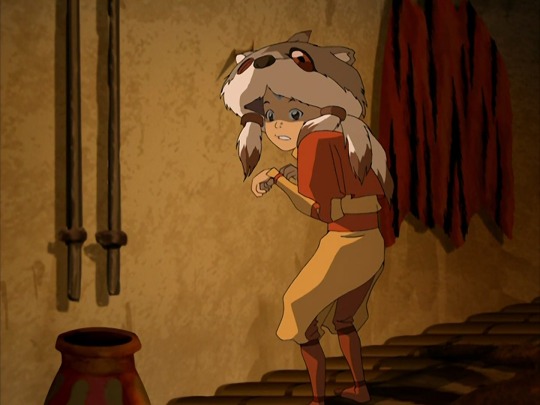
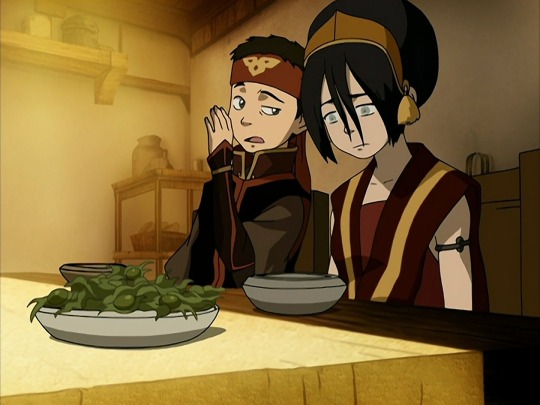
Ah, yes. Playing with a cultural artifact like it’s a toy because you were upset about not being the center of attention for once, and telling everyone how disgusting you think cultural food is, what great ways to show the supposed love of your life how much you respect her culture!
I know your response to this point would be something like “uwu but he’s a kid he didn’t knowww” ok well. The same logic can be applied to any alleged “racism” on Zuko’s part.
2. “Demanding” forgiveness
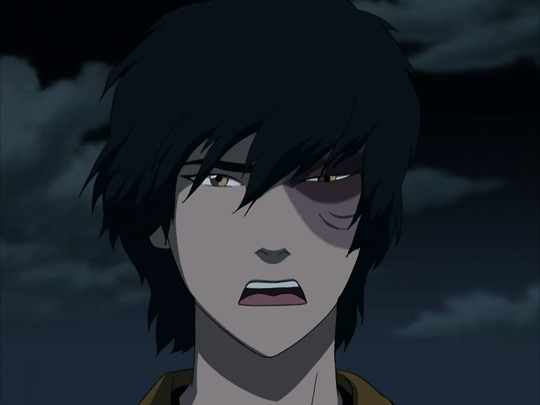
Zuko: What can I do to make it up to you?
Ah, yes. How demanding of him. He’s clearly so self-centered and only thinking about his own values and agenda here.
It’s not like he…
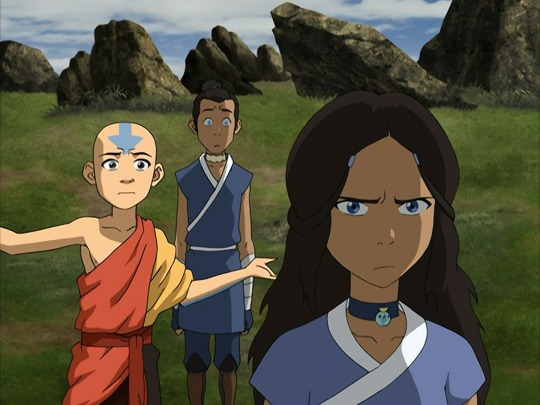
…told his friend how she’s allowed to process her grief and try to impose his own morals…

…or demanded to know if his crush liked him back, wouldn’t accept “no” as an answer, and forced a kiss on her…
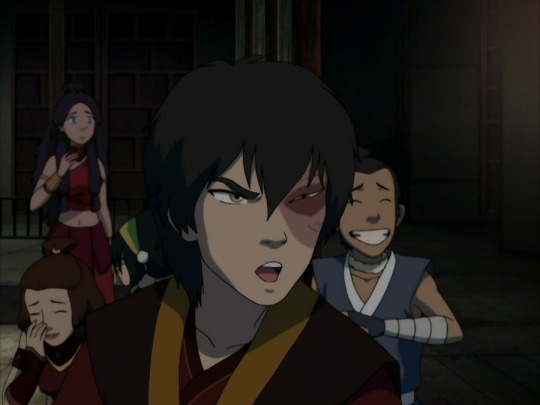
…or told an abuse victim he was wrong to want to kill his abusive father for trying to commit a genocide…
…oh, um. Yeah. Sorry, but after actually watching the show it’s very clear to me which character doesn’t seem to regret or see the flaws in any of his actions at the end of the show, which is when all of these examples took place.
3. Training in the finale
“Attacking Aang to teach him a lesson” … wow, that’s a very dishonest way of phrasing that situation. I’m impressed, I have to say. I’ve seen lots of dumb takes from Aang stans over the years but this is a new one.
Well, luckily I actually watched the scene in context, so my reaction was the same as all the other characters’ reactions in canon when they learned the context behind this “attack”:
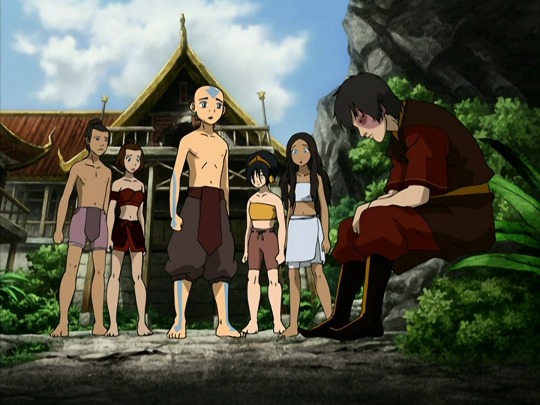
They agree with him. Yeah. Obviously, when nobody is taking training seriously when the world is about to literally go up in flames, you might need to do something to get their attention.
“But it was dangerous!” you might argue. Well… yeah. When magic and bending is in the equation, training in the Avatar universe has been shown to be somewhat dangerous at times. As an example, from this very same episode, Toph very nearly smashed Sokka with a giant flaming rock. That was way closer to hurting someone than Zuko was in this incident. If you’re going to fault characters for making their training exercises too dangerous, I guess Toph is mega cancelled.
Now back to Aang. What was his reaction in this situation? How did he react to the end of the world being days away? He ran away with absolutely no plan. Just like he did at the very beginning of the show.
I mean, think about it. This is a critical flaw (and toxic trait) in Aang that is literally never addressed, because he starts and ends the show the exact same way: he’s faced with a problem, he runs away from it, then he’s saved by an in-universe equivalent of an Act of God. Wowie, such great character development. Not fixing your core flaw and having a mythical plot device materialize into existence to solve your problems for you. Aang’s whole arc is a big blah, because the writing fails to address any of his flaws or have him meaningfully question any of his values.
Meanwhile, Zuko has consistently been a fan favorite because he’s the opposite. His flaws are meaningfully addressed, he does admit he’s wrong and fix his flaws, and his character shows a critically acclaimed change throughout the show. His arc is written so well that despite being a cartoon character, Zuko is widely considered the poster child for a good redemption arc across all forms of media.
So anyways, miss me with the double standards… there is a reason why Zuko is the fan favorite, and it’s not just his abs 🔥
645 notes
·
View notes
Text
i've written before about how fire lady katara isn't an inherently disempowering or racist trope, as have many others, but lately i've been thinking about how arguments against fire lady katara often tend to utilise a surface-level interpretation of colonial trauma.
[edit: this post will use the term "colonial trauma" because those who argue against fire lady katara usually use the same wording or are referring to that concept. but it's important to note that according to show canon, the fire nation did not colonize the southern water tribe and zuko and katara did not have a colonizer/colonized relationship.]
antis who present this argument usually posit that marrying zuko would be a form of re-traumatization for katara, while marrying aang would "protect" her. katara is supposedly more shielded from confronting the impact of colonization in the southern water tribe or on air temple island than she would be with zuko in the fire nation, which contextualizes colonial trauma purely through the lens of physical interaction with the colonial power (ie. living in the fire nation or looking after the people of the fire nation). whether intended or not, this argument inadvertently limits colonial trauma to the geographical boundaries of the colonizing country and implies that it can be reduced or averted solely by minimizing contact with said country.
even leaving aside that we have seen katara in the fire nation (and enjoying herself there), the implication here is that active engagement with a colonial power as a member of colonized peoples is an inherent form of re-traumatization... which i take issue with for multiple reasons.
firstly, katara lives in a world that has been permanently shaped and changed by imperialism, and that's going to affect her no matter where she goes. sequestering herself in the south pole her whole life and never seeing a glimpse of fire nation red again won't allow katara to escape the legacy of colonization or the trauma it has caused her, because its influence is rooted in everything from her family to her tribe to her own bending. believe me, i understand the appeal of a world where women of colour can avoid reckoning with the impact of colonization by simply never setting foot in the colonizing country again, and why people might be uncomfortable with zutara individually as a result - but i can't accept it as a valid argument against the ship, because that's just not how colonial trauma works.
secondly, the idea that this "protects" katara reeks of paternalism because katara is not a character who chooses her path simply based on how safe or comfortable it is. if that was the case, she would never have left the southern water tribe at all! she could've remained there her whole life and likely been safe, since the fire nation had no real interest in the south pole any longer. katara is fundamentally defined by how relentlessly revolutionary she is - over and over, she chooses to do what is right, what is hard, what is unexpected, even at cost to herself. she challenges injustice and discrimination and bigotry; she fights for the downtrodden and speaks for those who can't speak for themselves; she will never ever turn her back on the people who need her. does that truly sound like someone who needs to be hid away and protected from her own supposed re-traumatization?
thirdly - and i fully accept that there are those who might disagree with this - katara actively choosing to engage with her colonial trauma can be empowering just as it can be traumatizing. don't get me wrong: as a woc and a minority in my own country, i understand how tiring it is to do this. i understand the exhaustion of confronting what was done to you and your people, of facing down bigotry over and over. i understand the desire to run away from it all, and why it can be wish fulfilment for others to let katara do so. i really, really do.
but there is also wish fulfilment in letting katara fight, as a brown girl with power and resources that few brown girls in the real world hold. there is a power fantasy in seeing katara head into the belly of the beast and emerging triumphant. there is empowerment to be found in seeing katara struggle with racism and ignorance and mindless hate to enact change - and succeed. i love reading and writing about katara unpacking her trauma regarding the fire nation, about growing to love the place she once hated, about reconciling both her homes and healing from the wounds of her childhood.
and ultimately, i think that's what katara would want for herself. after throwing herself head first into the fight against the fire nation, after facing down her greatest trauma instead of letting it consume her, after helping and protecting the people of the fire nation, after refusing to let the fire nation take anything else from her - i firmly believe that the last thing katara would do is allow herself to be ruled by the fire nation instead of being the one ruling it.
personally, i find that a more hopeful and victorious narrative than one where she remains safe and sheltered away from the fire nation, but forever haunted and dictated by her trauma. would that be realistic? perhaps. but the entire point of foiling katara with characters like jet and hama is to show that she's not doomed to be mired in the pain of her past. that where their stories could only end in tragedy, hers can - and does - end in hope for something better, as she always believed it could.
300 notes
·
View notes
Text
One of my favorite parallels between Aang and Zuko is during the crossroads of destiny episode. I feel like it’s more subtle since lot that happened was side sweep mostly in Aang case unfortunately.
For most of the story we noticed Aang and Zuko are parallel with each other for example we get their back stories at the same time, we watch them work together. And during the guru and crossroad episode we see that they need to make an active decision on who they are meant to be. Time to face there wants and needs.
For Aang his want is to be with Katara no matter the cost vs his need to master the avatar state.
And for Zuko it’s wanting to go home to the fire nation vs need to do the right thing and make an active decision and be branded as a traitor.
And the really interesting part is that the writers use katara as an anchor in away to express this point.
My favorite way to explain it is that Zuko was suppose to let Katara in and Aang was suppose to let her go.
And guess what they both fail.
Zuko’s betrayal was supposed to be a surprise for both the audience and the characters. all out in the open. oh no! Zuzu we where rooting for you! How could you?
Aangs betrayal was a secret only the audience and Aang knew about it. And it should have been explored more in season three. And yes Aang did betray everyone when he turn his back on the Guru. And he definitely betrayed Katara in that moment, because all katara wants is for him to have control of the avatar state and end this war. And it crazy that Aang keeps the truth to himself, like he doesn’t feel bad about keeping that from Katara? So much for getting the mark of the trusted. Am I right? (Sure the show tried to explain that azula’s lightning blocked his chakras now but that sounds more like a sloppy way to fix it so Aang can get his forever girl, also it ruins the narrative, this was an internal struggle for Aang to overcome) I have heard the argument that Aang being shot with lightning was a punishment for letting go of Katara but I see it more as a punishment for letting her go in that moment when he should have already done it. Think about it if he just mastered the avatar state he essentially could’ve just rolled into Ba Sing Se with god mode activated, stopped Azula and black sun would have been a success and war is over. Him not letting go of Katara when the Guru suggests it does however tie into he’s character flaw, avoidance. he waited till he has no choice but to do it so he is “punished” for it.
Well at least Zuko got to redeem himself. All Aang got was a perfectly place rock it’s a shame.
#zutara#anti kataang#aang critical#Zuko and Aang parallel#crossroads of destiny#atla critical#atla meta#kataang critical#pro zutara
278 notes
·
View notes